|
|
|
Sort Order |
|
|
|
Items / Page
|
|
|
|
|
|
|
| Srl | Item |
| 1 |
ID:
107813
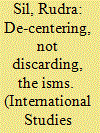

|
|
|
|
|
| Publication |
2011.
|
| Summary/Abstract |
The authors are sympathetic to much of David Lake's argument in his critique of paradigmatic 'isms' in the field. However, they also seek to qualify his diagnosis of the problem and critically assess some of his prescriptions and his efforts to manage epistemological divides in the field. In the process, the authors also clarify certain aspects of 'analytic eclecticism'.
|
|
|
|
|
|
|
|
|
|
|
|
|
|
|
|
| 2 |
ID:
107810
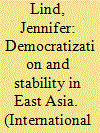

|
|
|
|
|
| Publication |
2011.
|
| Summary/Abstract |
Anticipating future political transitions in East Asia, many scholars worry that Chinese democratization and Korean unification will fuel regional instability. To inform this debate, this article examines theories that make competing claims about the stability of these potential transitions: theories within the "democratization and war" school and economic interdependence theory. I compare the predictions of these theories in the cases of previous East Asian transitions in Japan, South Korea, and Taiwan. Process-tracing evidence shows that (i) xenophobic nationalism or logrolling by political coalitions were not present and that none of these countries pursued bellicose foreign policies during their democratic transitions. Evidence from these cases undermines the broad formulation of democratization and war theory and is consistent with a more recent, narrower version of this theory. Second, (ii) process tracing reveals the stabilizing processes of economic interdependence in all of these cases. Third and finally, contrary to prevailing views that warn of instability during future transitions, (iii) both the narrow version of democratization and war theory and economic interdependence theory forecast stability during the upcoming political transitions in China and Korea. These findings support foreign policy strategies of economic and institutional engagement toward China and the Korean peninsula.
|
|
|
|
|
|
|
|
|
|
|
|
|
|
|
|
| 3 |
ID:
105881
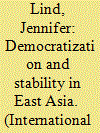

|
|
|
|
|
| Publication |
2011.
|
| Summary/Abstract |
Anticipating future political transitions in East Asia, many scholars worry that Chinese democratization and Korean unification will fuel regional instability. To inform this debate, this article examines theories that make competing claims about the stability of these potential transitions: theories within the "democratization and war" school and economic interdependence theory. I compare the predictions of these theories in the cases of previous East Asian transitions in Japan, South Korea, and Taiwan. Process-tracing evidence shows that (i) xenophobic nationalism or logrolling by political coalitions were not present and that none of these countries pursued bellicose foreign policies during their democratic transitions. Evidence from these cases undermines the broad formulation of democratization and war theory and is consistent with a more recent, narrower version of this theory. Second, (ii) process tracing reveals the stabilizing processes of economic interdependence in all of these cases. Third and finally, contrary to prevailing views that warn of instability during future transitions, (iii) both the narrow version of democratization and war theory and economic interdependence theory forecast stability during the upcoming political transitions in China and Korea. These findings support foreign policy strategies of economic and institutional engagement toward China and the Korean peninsula
|
|
|
|
|
|
|
|
|
|
|
|
|
|
|
|
| 4 |
ID:
107804
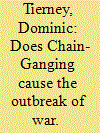

|
|
|
|
|
| Publication |
2011.
|
| Summary/Abstract |
Realists have argued that fears over the defection or defeat of an ally can draw states into wars against their broader interests ("chain-ganging"). However, the logic underpinning chain-ganging theory is flawed, and the paradigmatic case-World War I-is not an instance of chain-ganging causing the outbreak of war. The paper draws on recent literatures on alliance restraint and the origins of World War I to provide the first extensive critique of chain-ganging theory, examines the impact on chain-ganging of a number of factors including power and interests, and suggests policy implications for an emerging multipolar system.
|
|
|
|
|
|
|
|
|
|
|
|
|
|
|
|
| 5 |
ID:
105875
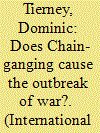

|
|
|
|
|
| Publication |
2011.
|
| Summary/Abstract |
Realists have argued that fears over the defection or defeat of an ally can draw states into wars against their broader interests ("chain-ganging"). However, the logic underpinning chain-ganging theory is flawed, and the paradigmatic case-World War I-is not an instance of chain-ganging causing the outbreak of war. The paper draws on recent literatures on alliance restraint and the origins of World War I to provide the first extensive critique of chain-ganging theory, examines the impact on chain-ganging of a number of factors including power and interests, and suggests policy implications for an emerging multipolar system.
|
|
|
|
|
|
|
|
|
|
|
|
|
|
|
|
| 6 |
ID:
105877


|
|
|
|
|
| Publication |
2011.
|
| Summary/Abstract |
Why does Europeanization-the process of adopting European rules-advance in some countries, while it stalls in others? What explains different European trajectories of otherwise similar candidate states? This article explains foreign policy choices of EU candidate states with an identity-based theoretical framework. In states where European identity is a widely shared social value, the inevitable short-term costs of Europeanization-economic, social, and political-will still be worth the price of admission because becoming "European" trumps other domestic political concerns. In contrast, in countries where the European idea is not broadly shared, pro-European groups will find it hard to forge crosscutting coalitions needed to successfully promote Europeanization with all its associated costs. To illustrate these theoretical insights, I compare Europeanization in Croatia and Serbia, the two Balkan states with similar regional status, shared legacies of communism, and ethnic war, yet quite different European trajectories. I argue that the process of identity convergence explains Croatia's rapid compliance with controversial EU requirements, while in neighboring Serbia, identity divergence has derailed Serbia's EU candidacy.
|
|
|
|
|
|
|
|
|
|
|
|
|
|
|
|
| 7 |
ID:
107806
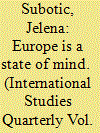

|
|
|
|
|
| Publication |
2011.
|
| Summary/Abstract |
Why does Europeanization-the process of adopting European rules-advance in some countries, while it stalls in others? What explains different European trajectories of otherwise similar candidate states? This article explains foreign policy choices of EU candidate states with an identity-based theoretical framework. In states where European identity is a widely shared social value, the inevitable short-term costs of Europeanization-economic, social, and political-will still be worth the price of admission because becoming "European" trumps other domestic political concerns. In contrast, in countries where the European idea is not broadly shared, pro-European groups will find it hard to forge crosscutting coalitions needed to successfully promote Europeanization with all its associated costs. To illustrate these theoretical insights, I compare Europeanization in Croatia and Serbia, the two Balkan states with similar regional status, shared legacies of communism, and ethnic war, yet quite different European trajectories. I argue that the process of identity convergence explains Croatia's rapid compliance with controversial EU requirements, while in neighboring Serbia, identity divergence has derailed Serbia's EU candidacy.
|
|
|
|
|
|
|
|
|
|
|
|
|
|
|
|
| 8 |
ID:
107811


|
|
|
|
|
| Publication |
2011.
|
| Summary/Abstract |
Using two new data sources to describe trends in the international relations (IR) discipline since 1980-a database of every article published in the 12 leading journals in the field and three surveys of IR faculty at US colleges and universities-we explore the extent of theoretical, methodological, and epistemological diversity in the American study of IR and the relationship between IR scholarship and the policy-making community in the United States. We find, first, that there is considerable and increasing theoretical diversity. Although US scholars believe and teach their students that the major paradigms-realism, liberalism, Marxism, and constructivism-define and divide the discipline, most peer-reviewed research does not advance a theoretical argument from one of these theoretical traditions. There is no evidence, moreover, that realism and its focus on power relations among states dominate, or since 1980 ever has dominated, the literature. Second, although three times as many IR scholars report using qualitative methods as their primary approach, more articles published in the top journals currently employ quantitative tools than any other methodological approach. Third, there exists little epistemological diversity in the field: American IR scholars share a strong and growing commitment to positivism. Finally, there is a disjuncture between what American scholars of IR think about the value of producing policy-relevant work and the actual research they generate: few articles in top journals offer explicit policy advice, but scholars believe that their work is both prescriptive and useful to policymakers.
|
|
|
|
|
|
|
|
|
|
|
|
|
|
|
|
| 9 |
ID:
105876
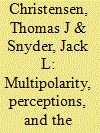

|
|
|
|
|
| Publication |
2011.
|
| Summary/Abstract |
In "Does Chain-Ganging Cause the Outbreak of War," Dominic Tierney critiques our work on alliance politics in Europe in the first half of the twentieth century. Tierney incorrectly ascribes to us a theory about the outbreak of conflict based on a "chain-ganging theory" in which war occurs because states become so tightly tied to their allies that they lose volition and find themselves in conflicts not of their own choosing. In fact, we do not try to explain the origins of war, but instead explain why wars in Europe escalated to a continent-wide scale. Here we briefly restate our argument and demonstrate how Tierney misconstrues it. We also show how some of the factors that we discuss in our original work are useful for assessing Tierney's claim that the causes of conflict and alliance dynamics hinge on whether states are hawks or doves.
|
|
|
|
|
|
|
|
|
|
|
|
|
|
|
|
| 10 |
ID:
107805
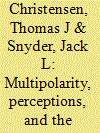

|
|
|
|
|
| Publication |
2011.
|
| Summary/Abstract |
In "Does Chain-Ganging Cause the Outbreak of War," Dominic Tierney critiques our work on alliance politics in Europe in the first half of the twentieth century. Tierney incorrectly ascribes to us a theory about the outbreak of conflict based on a "chain-ganging theory" in which war occurs because states become so tightly tied to their allies that they lose volition and find themselves in conflicts not of their own choosing. In fact, we do not try to explain the origins of war, but instead explain why wars in Europe escalated to a continent-wide scale. Here we briefly restate our argument and demonstrate how Tierney misconstrues it. We also show how some of the factors that we discuss in our original work are useful for assessing Tierney's claim that the causes of conflict and alliance dynamics hinge on whether states are hawks or doves.
|
|
|
|
|
|
|
|
|
|
|
|
|
|
|
|
| 11 |
ID:
105879
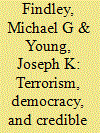

|
|
|
|
|
| Publication |
2011.
|
| Summary/Abstract |
What explains the variation in terrorism within and across political regimes? We contend that terrorism is most likely to occur in contexts in which governments cannot credibly restrain themselves from abusing their power in the future. We consider a specific institutional arrangement, whether a state has an independent judiciary, and hypothesize that independent judiciaries make government commitments more credible, thereby providing less incentive for the use of terrorism. Using a recently released database that includes transnational and domestic terrorist events from 1970 to 1997, we estimate a set of statistical analyses appropriate for the challenges of terrorism data and then examine the robustness of the results. The results provide support for the credible commitment logic and offer insights into the different ways that political institutions increase or decrease terrorism.
|
|
|
|
|
|
|
|
|
|
|
|
|
|
|
|
| 12 |
ID:
107808
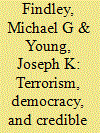

|
|
|
|
|
| Publication |
2011.
|
| Summary/Abstract |
What explains the variation in terrorism within and across political regimes? We contend that terrorism is most likely to occur in contexts in which governments cannot credibly restrain themselves from abusing their power in the future. We consider a specific institutional arrangement, whether a state has an independent judiciary, and hypothesize that independent judiciaries make government commitments more credible, thereby providing less incentive for the use of terrorism. Using a recently released database that includes transnational and domestic terrorist events from 1970 to 1997, we estimate a set of statistical analyses appropriate for the challenges of terrorism data and then examine the robustness of the results. The results provide support for the credible commitment logic and offer insights into the different ways that political institutions increase or decrease terrorism.
|
|
|
|
|
|
|
|
|
|
|
|
|
|
|
|
| 13 |
ID:
107809
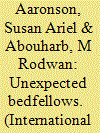

|
|
|
|
|
| Publication |
2011.
|
| Summary/Abstract |
The WTO system and democratic rights are unexpected bedfellows. The GATT/WTO requires governments to adopt policies that provide foreign products (read producers) with due process, political participation, and information rights related to trade policymaking. Because these nations also provide these rights to their citizens, a growing number of people are learning how to influence trade-related policies. As trade today encompasses many areas of governance, these same citizens may gradually transfer the skills learned from influencing trade policies to other public issues. Thus, the WTO not only empowers foreign market actors, but also citizens in repressive states. We use both qualitative and quantitative analysis to examine whether membership in the WTO over time leads to improvements in these democratic rights. Our qualitative analysis shows that these issues are discussed during accessions and trade policy reviews. Quantitative analysis examines how members of the GATT/WTO perform on these democratic rights over time. We use a cross-national time series design of all countries, accounting for selection issues of why countries become members of the GATT/WTO regime. We find that longer GATT/WTO membership leads to stronger performance on our metrics for political participation, free and fair elections, and access to information.
|
|
|
|
|
|
|
|
|
|
|
|
|
|
|
|
| 14 |
ID:
105880


|
|
|
|
|
| Publication |
2011.
|
| Summary/Abstract |
The WTO system and democratic rights are unexpected bedfellows. The GATT/WTO requires governments to adopt policies that provide foreign products (read producers) with due process, political participation, and information rights related to trade policymaking. Because these nations also provide these rights to their citizens, a growing number of people are learning how to influence trade-related policies. As trade today encompasses many areas of governance, these same citizens may gradually transfer the skills learned from influencing trade policies to other public issues. Thus, the WTO not only empowers foreign market actors, but also citizens in repressive states. We use both qualitative and quantitative analysis to examine whether membership in the WTO over time leads to improvements in these democratic rights. Our qualitative analysis shows that these issues are discussed during accessions and trade policy reviews. Quantitative analysis examines how members of the GATT/WTO perform on these democratic rights over time. We use a cross-national time series design of all countries, accounting for selection issues of why countries become members of the GATT/WTO regime. We find that longer GATT/WTO membership leads to stronger performance on our metrics for political participation, free and fair elections, and access to information.
|
|
|
|
|
|
|
|
|
|
|
|
|
|
|
|
| 15 |
ID:
105878
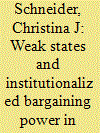

|
|
|
|
|
| Publication |
2011.
|
| Summary/Abstract |
A Stata replication package can be obtained from the author's Web page. I thank two anonymous reviewers, Josephine Andrews, David Armstrong, Scott Desposato, Mark Fey, Erik Gartzke, Hein Goemans, Peter Gourevitch, Katharina Holzinger, Mareike Kleine, Daniel Kono, Hartmut Lenz, Dirk Leuffen, Matthew Loveless, Zeev Maoz, Heather McKibben, Andy Moravcsik, Frank Schimmelfennig, Gilles Serra, Ben Shepherd, Branislav Slantchev, Randy Stevenson, Randy Stone, Dustin Tingley, Jennifer Tobin, Ingeborg Toemmel, Piero Tortola, Camber Warren, Matt Winters, and Langche Zeng for invaluable comments. I also received helpful comments from presentations at European Studies Association Conference (Los Angeles), Nuffield College (Oxford), Princeton University, University of California (Davis), University of Rochester, Rice University, University of California (San Diego), and University of Konstanz. This research project was supported by the Max Planck Society and the German Research Foundation. Ilka Ritter provided valuable research assistance. The usual disclaimer applies
|
|
|
|
|
|
|
|
|
|
|
|
|
|
|
|
| 16 |
ID:
107807
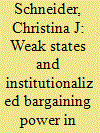

|
|
|
|
|
| Publication |
2011.
|
| Summary/Abstract |
When and how can weak states increase their bargaining leverage in international organizations? I argue that during phases of routine bargaining, distributional outcomes depend on the states' political and economic leverage and less on the formal allocation rules, so they are unfavorable to weak states. This changes in phases of extraordinary bargaining, which are occasioned by significant reform such as enlargement. States that expect distributional conflict from enlargement can threaten to block accession negotiations and increase their membership benefits even if they are politically weak. Statistical and qualitative analyses of distributional bargaining in the European Union support the theoretical claims.
|
|
|
|
|
|
|
|
|
|
|
|
|
|
|
|
| 17 |
ID:
107812
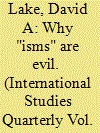

|
|
|
|
|
| Publication |
2011.
|
| Summary/Abstract |
This essay probes tensions between our professional practices and the quality of our professional output in the field of international studies. We organize ourselves into academic "sects" that engage in self-affirming research and then wage theological debates between academic religions. This occurs at both the level of theory and epistemology. Unfortunately, this academic sectarianism produces less understanding rather than more. Theoretically, we should focus on developing contingent, mid-level theories of specific phenomena. Epistemologically, we should recognize there are multiple valid and perhaps even complementary paths to understanding.
|
|
|
|
|
|
|
|
|
|
|
|
|
|
|
|
|
|
|
|
|